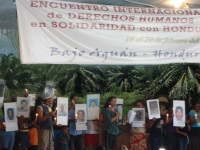World Bank Slammed for Dinant Loan Linked to Honduran Killings

An independent ombudsman has confirmed that World Bank officials should have raised serious questions about human rights abuses before approving a $30 million loan to Corporación Dinant in Honduras in 2009 for a palm oil plantation project. Despite the findings, the Bank has refused to cut ties to Dinant.
Dinant, a major Honduran snack food and agricultural company owned by Miguel Facussé, has cashed in on a recent boom in demand for biofuels to become one of the biggest players in this field in the Honduras - it manages 22,000 acres of palm tree plantations, exporting half of the produce to other countries. (Palm trees yield a fruit which can be processed to produce biofuels that is in high demand by governments who want industry to reduce their dependence on fossil fuels like coal and petroleum in order to meet international obligations to mitigate global warming under the Climate Change convention)
Much of the palm oil development in the Honduras is taking place in the Bajo Aguán valley where an escalating conflict is taking place between large land owners and thousands of landless peasants.
"At least 19 farmers in this region have been killed in the context of conflicts with biofuel industry interests and given that Honduras, since the June 2009 military coup, has been ruled by an illegitimate and repressive regime," wrote Rights Action, a Washington DC based group that works in
Central America. "Concurrently, Dinant is immersed in numerous explosive land conflicts in which credible charges of violent actions, including murders, and fraudulent land acquisitions had been levied against the company."
Despite the fact that the situation was well known - the International Finance Corporation (IFC) - the private
sector arm of the World Bank - made a $30 million loan to Dinant in 2009.
One year later, a complaint about the IFC loan was
sent to the president of the World Bank in November 2010 by a group of
NGOs. The complaint was taken up by the Office of the
Compliance Advisor/Ombudsman (CAO) of the IFC.
CAO has weighed in to agree partially with Rights Action. "In a sector and country where risks of conflict and violence around land were or should have been known to the team, CAO finds that IFC's review was not "commensurate to risk," the Office of the Compliance Advisor/Ombudsman (CAO) of the International Finance Corporation said in its audit. The IFC, it said, "was or should have been aware of a series of public allegations and negative perceptions in relation to its client."
The activists say this confirmation is important. "You've got credible evidence that IFC's client was complicit in forced evictions, drug trafficking, and dozens of killings and was likely an accomplice to the overthrow of a democratically elected government, and there are zero consequences," David Pred, executive director of Inclusive Development International, told the Huffington Post, an online newspaper.
However, the IFC has refused to cut its ties with Dinant. "As long as things are moving in the right direction, we feel we are adding more value by remaining engaged," Atul Mehta, the IFC's global director of agribusiness, told the Financial Times, stating that the information that the World Bank had in 2009 "did not suggest that this was an entity we shouldn't be doing business with."
NGOs are dismayed. "We are deeply disappointed that the World Bank's response to this investigation has not taken into account the violations of the human rights of poor farmers in the Aguán Valley who have been the direct victims of Corporación Dinant," Yoni Rivas, general secretary of the Movement of Unified Campesinos in Aguán (Muca) told the Financial Times.
"It really makes you wonder what kind of crimes a company needs to commit before IFC will cut off its support," added Pred
"The IFC has once again asked the public to blindly trust the institution, even as the basis for such trust is shaken by the revelations in this report," Jessica Evans of Human Rights Watch said in a press statement. "Human lives and livelihoods are at stake here. The IFC should demand an external, expert investigation that could create a framework for Dinant to remedy any violations of its responsibility to respect human rights."
(For more details on Dinant in Honduras, see this CorpWatch blog from December 2012)
- 194 World Financial Institutions



